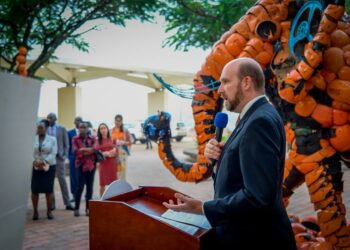Fiida Dianah Nabirye and her seven siblings were abandoned by their father when Fiida was 10 years old. What hurt Fiida most was that her father’s excuse was her albinism. Fiida’s birth was not only seen as a ‘bad omen’ that drove their father away, but the family was worried how she would survive in her village in present Buyende District.
When Fiida was born she looked so fragile and yet beautiful. Her siblings were excited having a sister who was “mzungu.” Their mother warned them not to tell anyone. Soon though, word spread that the baby was a “namagoye,” a derogative name for people with albinism.
“I never thought of abandoning my baby. Her eyes were so blue and beautiful but she needed special care even when others said it was a curse,” Tofirista Tigairya, Fiida’s mother, says.
When Fiida started school, her fellow pupils laughed at her and called her names. She felt excluded and unloved. She abandoned school in primary five.
“I cried all the time why I was different from others. Wherever I went, I was called namagoye. Whenever I asked my mother why, she too cried,” Fiida, now 27, narrates.

Turning point
Late last year, Send a Cow Uganda in partnership, with the National Union of Women with Disabilities of Uganda (NUWODU), approached Fiida and other women with disabilities to form a group that would be supported to improve their livelihoods and empower them to advocate for land and other resources for agricultural production.
Fiida not only was she qualifying as a beneficiary because of her albinisim but also she had been widowed three years ago. Send a Cow deliberately reaches out to women especially the widowed. And Fiida’s double vulnerability qualified her for support from the programme from the point of being a single mother and because she fits into the disability context of the activity.
“This was the first time anyone was reaching out to me to help me to stand on my own. I had always depended on others. In fact, I received the news with doubt. It was not long before they sent us community trainers on how to form a group and how we can be involved in agriculture,” Fiida says.
Today, the widowed young lady and mother of two daughters says the activity has helped her to grow enough food for her family and has surplus for sale.

“The activity supported us with vegetable seeds such as aubergines, green-leaf vegetables and orange fleshed potato vines to improve our nutrition. I planted the greens and within a short time, we had enough to eat and the rest for sale. I now sell vegetables in the market. My sweet potatoes are also doing very well.
“From the sale of vegetables, I have been able to send my daughters back to school. They had dropped out due to lack of money. I have been enabled to reach out to higher district authorities to speak on behalf of other persons with disabilities at district meetings and spoken for my fellow persons with disability. I no longer feel pity for myself. I have been given voice and confidence,” Fiida says.
Fiida is now the Chairperson of her group of 15 members and they have a savings association where each of the member saves at least Ushs.1,000 per week. They lend to others with a 3% interest per month, and the interest is shared among members every six months. She was also recently elected to a board member of Buyende District Women with Disabilities Association, a District-level People’s Organisation representing persons with albinism. She has also participated in the district budget review conference.
The all-inclusive USAID-supported Agriculture for Women and Girls with Disabilities Activity works to improve the livelihoods of 1,000 households of women and girls with disabilities through access and utilization of productive resources like land, livestock and application of climate-smart agricultural practices that emphasize water and soil conservation.
Through this activity, women and girls with disability are trained in land rights and encouraged to fully participate in sustainable integrated organic agriculture —including crops and small livestock—for better livelihoods. The activity is implemented in partnership with the National Union of Women with Disabilities of Uganda and its 7 member associations at district and sub county levels, and also strengthens their capacity to lobby and advocate access to land for production.
Do you have a story in your community or an opinion to share with us: Email us at editorial@watchdoguganda.com











